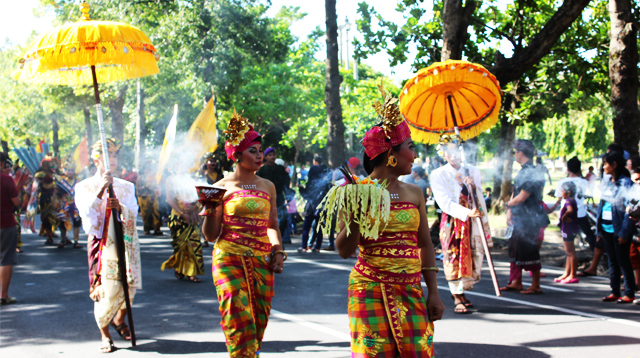BASIC philosophy of the Balinese people, which underlies their approach to living a harmonious life and practicing tolerance, is deeply rooted in their unique blend of Hinduism, local animist beliefs, and cultural values.
This intricate philosophy is known as “Tri Hita Karana” and “Tri Kaya Parisudha,” which guide their daily lives, social interactions, and spiritual practices. In addition, they also maintain harmonious relations of physical and transcendental (sekala and niskala) realm.
Tri Hita Karana translates to “Three Ways to Happiness” and represents the core principles of Balinese philosophy. They are consisting of three elements, namely:
Harmony with the Gods: Balinese people believe in maintaining a harmonious relationship with the spiritual world. They perform daily rituals, offerings, and temple ceremonies to appease the gods and spirits. This spiritual connection is considered essential for their well-being.
Harmony with Nature: Balinese society places significant emphasis on the environment. They believe in living in harmony with nature and preserving the island’s natural beauty. This principle encourages practices of environmental sustainability and conservation.
Harmony among Humans: The Balinese emphasize maintaining harmonious relationships with fellow humans. This involves practicing kindness, respecting one another, and fostering a sense of community and unity. Balinese people are known for their strong sense of social cohesion and collective responsibility.
Tri Kaya Parisudha translates to “Three Ways to Reach Pureness of Mind” and represents the Balinese values related to personal and spiritual purity:
Tat Twam Asi (I am you, you are me) This concept reflects the interconnectedness of all beings. Balinese people believe that by recognizing the shared humanity in others, they can foster empathy and mutual understanding, leading to tolerance and unity.
Vasudaiva Kutumbhakam (We are brothers): Balinese culture promotes the idea that everyone on Earth is part of one big family. This mindset encourages inclusivity and the acceptance of diversity.
Rwa Bhineda (Balancing the Dualities): Balinese philosophy acknowledges the dualities that exist in life, such as good and evil, light and dark. It teaches people to find balance and harmony within these dualities, fostering a sense of equilibrium and tolerance.
Karmic Law (Law of Cause and Effect): The word “karma” is derived from the Sanskrit language and means “action” or “deed.” It refers to the accumulated actions, intentions, and moral choices of an individual. In short, if one does good deed, he will enjoy good results and on the contrary.
Balinese people incorporate these philosophical principles into their daily lives, from the way they interact with others to their environmental practices and religious ceremonies. This holistic approach to life helps them maintain a strong sense of community, promote social tolerance, and coexist harmoniously with the diverse cultures on the island.
Balinese culture is often seen as a model for peaceful coexistence and an example of how spirituality, nature, and human relationships can be intertwined to create a harmonious and tolerant society.










